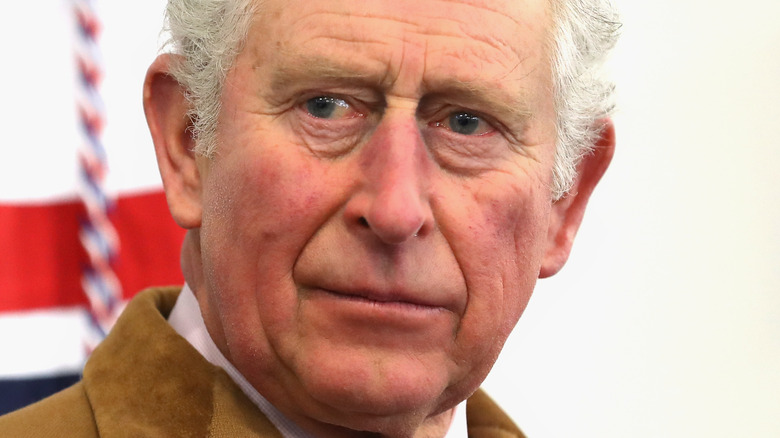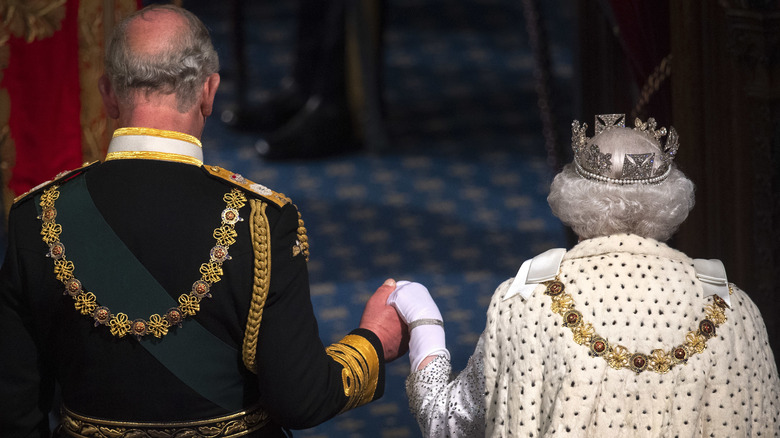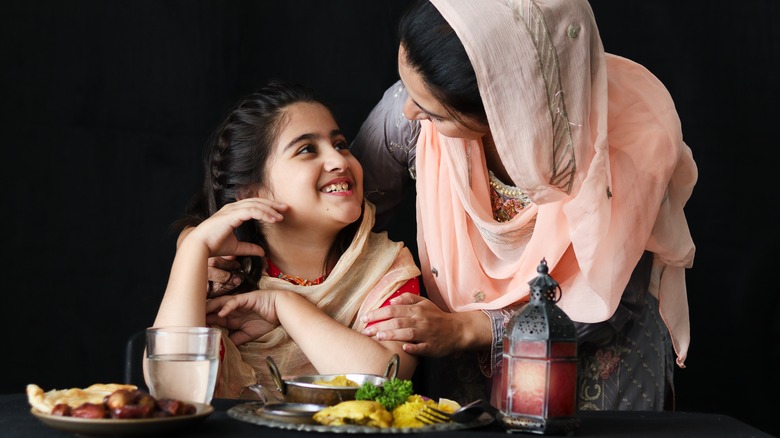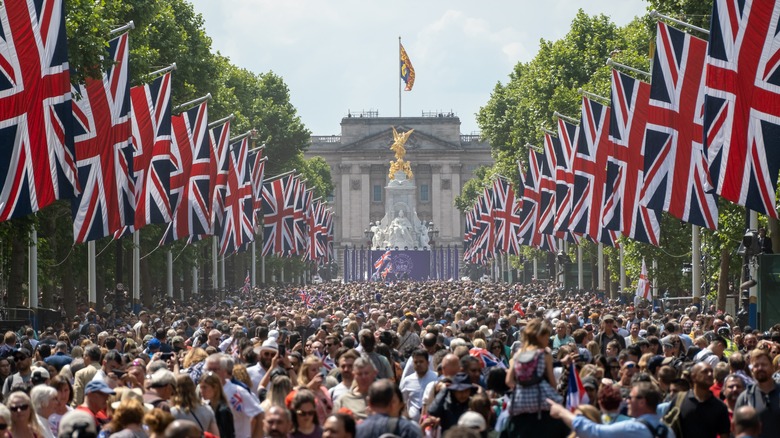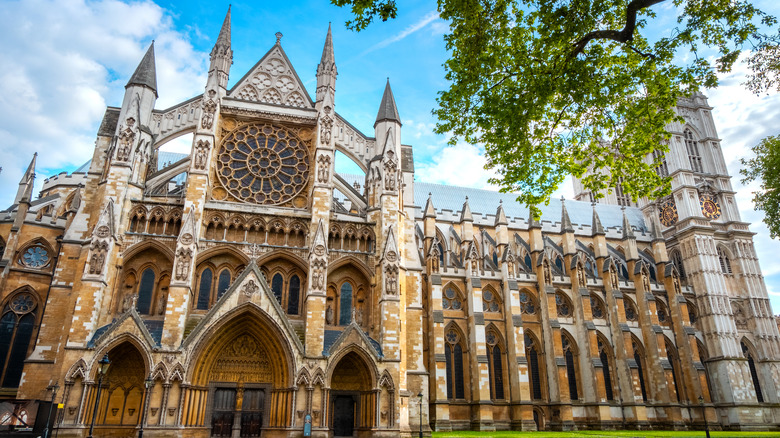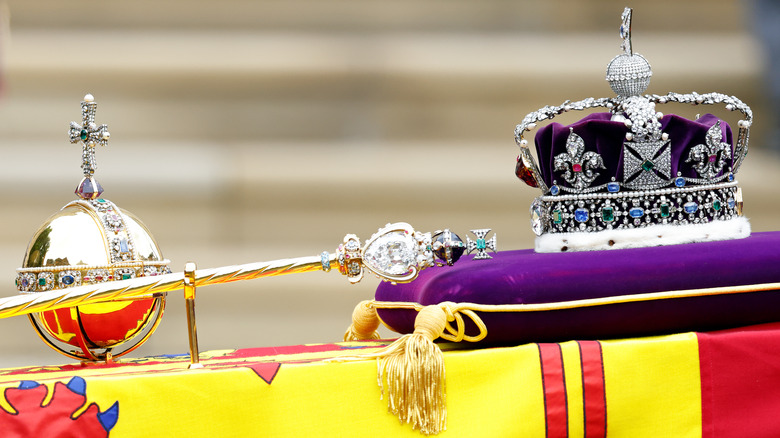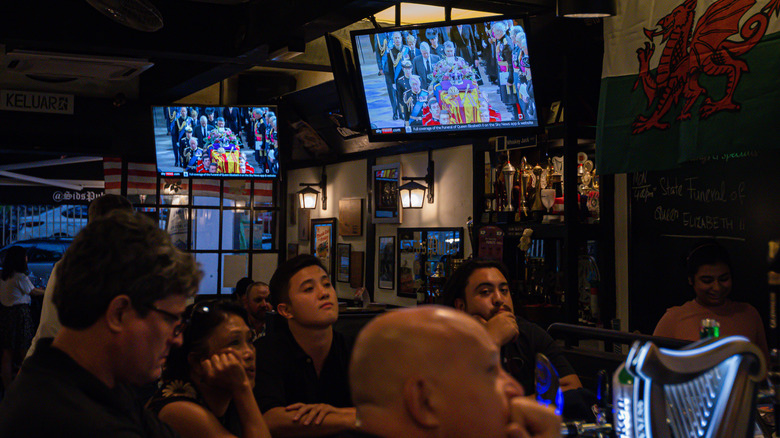When Is King Charles III's Coronation? How To Watch And More
Let's face it: members of royalty are not known for being what we'd call "down to Earth." Quite the opposite, in fact, what with their crowns, castles, private jets, and so forth. Some people dislike the world's remaining monarchies so much that they've even advocated just up and abolishing them. In the middle of Queen Elizabeth II's funeral, protestors in Australia were smoking up, wearing face paint, and waving signs while trotting through the streets and declaring that the U.K. monarchy be abolished as a "recognition of Indigenous suffering," as ABC News says. Even the new U.K. prime minister, Liz Truss, once said in 1994 that the monarchy ought to be abolished because *(via The Independent), "Everybody in Britain should have the chance to be a somebody."
But out of all of the arguments for disposing of a long-standing historical tradition, Time magazine overviewed what is arguably the most practical one: they cost too much. In other words, citizens are strapped for cash, want their taxes reduced, point to countries without monarchs, and say, "Hey, they don't have a king! We don't need one, either. We'll waste less money." Of course, nothing is so simple. Non-monarchical governments will find plenty of ways to be foolish wasters of public funds.
Into this debate steps King Charles III, son of the late and loved queen, Elizabeth II. Right out of the gate, he's vowed to use his coronation, dubbed "Operation Golden Orb," to prove he understands the plight of the common person.
Slimmed down and less expensive
For years, King Charles III has said that he wants to be "treated like any other" person and is "just an ordinary person in an extraordinary position," as The Conversation quotes. Now, he has the chance to prove as much and gain the trust of a British public that was extremely loyal to a former queen they'd grown accustomed to over decades, as conversations with Brits on The Guardian illustrate.
And so, the new king is planning to use his coronation — slated sometime next year in 2023, the 70th-year anniversary of his mother's coronation — to make a statement about his position and relationship with the members of the U.K. and the global Commonwealth. The Independent quotes a royal source who told the Daily Mirror that his coronation is going to be "shorter, smaller and less expensive" than Queen Elizabeth's in 1953. Her coronation, the first of its kind to be televised, cost £1.57 million, which in 2022 is about £48.7 million (via the CPI Inflation Calculator).
The Independent quoted a royal source as saying, "The King has long been an advocate of a streamlined or slimmed down monarchy and this project could certainly be said to fit with his vision," and, "The King is very aware of the struggles felt by modern Britons so will see his wishes carried through that although his coronation ceremony should stay right and true to the long-held traditions of the past, it should also be representative of a monarchy in a modern world."
A Britain that respects all faiths
Beyond mere money, King Charles III has vowed to make his coronation accurately reflect the religious and ethnic diversity of modern-day Britain. This doesn't mean that he won't also be the head of the Church of England. Ever since King Henry VIII broke with Catholicism and created the Anglican Church in 1534, every head-of-state of the United Kingdom has also been the head of its official state church, as the Royal Museums Greenwich outlines. King Charles will carry on this tradition.
However, in a very modern and legitimately welcoming move, Charles has also said that he wants to head "a Britain that respects all faiths," as The Independent puts it. At his coronation, he's inviting a congregation that includes not only members of the Church of England but people who follow a variety of major world religions, including "Christian, Muslim, Jewish, Hindu and Buddhist." And lest the more secularly-minded feel excluded, King Charles stated, "By my most profound convictions ... I hold myself bound to respect those who follow other spiritual paths, as well as those who seek to live their lives in accordance with secular ideals."
Charles said that this approach, and his reign on a whole, is meant to be a continuation of "his mother's legacy." Many people felt that even if Queen Elizabeth II was born royalty, there was something about her that was approachable and relatable to everyone. She was amongst those rare royals to whom people felt personally connected.
Reduced pomp and circumstance
A big part of King Charles III's decision to host a "slimmed down" coronation, as The Independent puts it, is the U.K.'s current cost-of-living crisis. At present, The Guardian reports that inflation in the U.K. has reached a huge 9.9%, and the average household's disposable income has dropped by 16.5%. Two in five households are cutting down on things like eating out and drinking with friends at pubs (vastly more troubling than it might seem to a non-Brit), which has affected the social lives of folks around the county, especially in a post-COVID-19 environment.
This doesn't mean that the new king will be getting rid of pomp and circumstance entirely — only trimming its edges. Whether or not he'll be pulled through the streets in a horse-drawn gold carriage like Elizabeth II and her coronation remains to be seen. At the very least, he doesn't want to flaunt his wealth in the faces of the suffering. Rather, a source told The Independent that he wants to "recognize what the people are experiencing day by day," which the outlet says suggests he wants to "demonstrate his understanding of the problems facing ordinary members of the public."
Despite his best intentions, King Charles has already been heckled by the public during a visit to Cardiff Castle in Wales. Someone shouted (via Independent.ie), "Charles, while we struggle to heat our homes, we have to pay for your parade."
Standard procedures at Westminster Abbey
Despite King Charles' intentions for his coronation, a minister told The Independent that "no plans" are currently underway. Folks are still taking stock following Queen Elizabeth II's funeral, which cost British taxpayers anywhere from £8 million and £20 million (per London World). Per The Independent, U.K. culture secretary Michelle Donelan told Sky News the money was "well spent." About Charles' coronation, she told LBC, "We need to look at the plans on this and obviously the Palace and the King will have a great deal of input into this."
That being said, we do know about certain traditional aspects of King Charles' impending coronation. For example, News18 says that the ceremony will almost certainly take place at Westminster Abbey, where the late Queen Elizabeth was coronated in 1953. The abbey has been used for coronations going back over 900 years, all the way to William the Conqueror in 1066 following his appropriation of the English throne during the Norman Invasion. So far, 38 coronations have been held in Westminster.
We also know that the coronation will be overseen by the Archbishop of Canterbury, Justin Welby, who gave a well-received, very Christian-themed speech in the abbey during Queen Elizabeth's funeral, as The Guardian describes. The archbishop will introduce King Charles to those in attendance and guide him in the recitation of vows. These vows, drafted in 1688, state that the new monarch will uphold laws passed in parliament, enforce justice "with leniency," and "do everything possible" to preserve the Church of England (per News18).
Operation Golden Orb is in the works
Even though specifics for King Charles III's coronation are up in the air, general plans have been underway for years. Like other royal events, Charles' coronation has a code name: "Operation Golden Orb." Contrast this with "Operation London Bridge," the code name given to kicking off Queen Elizabeth II's funeral arrangements, or "Operation Menai Bridge," the name for Charles' own funeral plans, as Cosmopolitan outlines.
While we don't have specifics about Operation Golden Orb, we can perhaps look to a word in the name itself: orb. During Queen Elizabeth's funeral, the U.K. royal scepter and orb were placed on top of her casket. These are ceremonial items dating back to 1661 and are passed from monarch to monarch along with the monarch's crown (via s People). And yes, the orb is, in fact, made of gold. This means that the code name for Charles' coronation is a simple reference to him receiving the orb and scepter from his late mother.
During his coronation, King Charles will hold onto the scepter and orb and sit on what's called the Coronation Chair, as The Telegraph reports. He'll be crowned with St. Edward's Crown, a headpiece made of gold and inset with 400 gems. Because of health and safety reasons, it's expected that about 2,000 people will be in attendance at the coronation, in contrast to Queen Elizabeth's 8,000. In the end, Charles will stand on the balcony of Buckingham Palace in view of the public.
How to watch the sovereign get crowned
For those interested in tuning in to the first-of-the-century royal proceedings and see King Charles III crowned sovereign, May 6 is the big date. The proceedings will be broadcast live, Greenwich Mean Time (GMT), although we don't know what time of day yet. But seeing as King Charles' mother, the late Elizabeth II, was coronated at 11:15 in the morning, perhaps King Charles will choose to follow in his mother's footsteps.
Those living in the U.K. will have easy and abundant access to the coronation thanks to the BBC's offer of a "one-off TV license dispensation" to basically any and all places with a television, as Hello Magazine says. Folks can gather in churches, community centers, and even commercial venues like movie theaters to tune into events. A bunch of different television stations will likely be involved, including ITV and Sky, as the event is of such "national importance," per the BBC. The U.K.'s Department for Culture, Media and Sport is even building more than 30 giant screen sites across the U.K. that'll allow the masses to gather and watch their new king get crowned in London, Manchester, Leeds, Belfast, Cardiff, and more.
For those not living in the U.K., have no fear. In the U.S. at least, ABC News and SkyNews have typically been responsible for airing royal events, so it makes sense that they would do the same this time.
